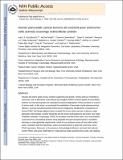| dc.contributor.author | Kamphorst, J. J. | |
| dc.contributor.author | Nofal, M. | |
| dc.contributor.author | Commisso, C. | |
| dc.contributor.author | Hackett, S. R. | |
| dc.contributor.author | Lu, W. | |
| dc.contributor.author | Grabocka, E. | |
| dc.contributor.author | Miller, G. | |
| dc.contributor.author | Drebin, J. A. | |
| dc.contributor.author | Bar-Sagi, D. | |
| dc.contributor.author | Thompson, C. B. | |
| dc.contributor.author | Rabinowitz, J. D. | |
| dc.contributor.author | Vander Heiden, Matthew G. | |
| dc.date.accessioned | 2016-12-14T21:07:35Z | |
| dc.date.available | 2016-12-14T21:07:35Z | |
| dc.date.issued | 2015-02 | |
| dc.identifier.issn | 0008-5472 | |
| dc.identifier.issn | 1538-7445 | |
| dc.identifier.uri | http://hdl.handle.net/1721.1/105821 | |
| dc.description.abstract | Glucose and amino acids are key nutrients supporting cell growth. Amino acids are imported as monomers, but an alternative route induced by oncogenic KRAS involves uptake of extracellular proteins via macropinocytosis and subsequent lysosomal degradation of these proteins as a source of amino acids. In this study, we examined the metabolism of pancreatic ductal adenocarcinoma (PDAC), a poorly vascularized lethal KRAS-driven malignancy. Metabolomic comparisons of human PDAC and benign adjacent tissue revealed that tumor tissue was low in glucose, upper glycolytic intermediates, creatine phosphate, and the amino acids glutamine and serine, two major metabolic substrates. Surprisingly, PDAC accumulated essential amino acids. Such accumulation could arise from extracellular proteins being degraded through macropinocytosis in quantities necessary to meet glutamine requirements, which in turn produces excess of most other amino acids. Consistent with this hypothesis, active macropinocytosis is observed in primary human PDAC specimens. Moreover, in the presence of physiologic albumin, we found that cultured murine PDAC cells grow indefinitely in media lacking single essential amino acids and replicate once in the absence of free amino acids. Growth under these conditions was characterized by simultaneous glutamine depletion and essential amino acid accumulation. Overall, our findings argue that the scavenging of extracellular proteins is an important mode of nutrient uptake in PDAC | en_US |
| dc.description.sponsorship | Stand Up To Cancer (Dream Team Translational Research Grant SU2C-AACR-DT0509) | en_US |
| dc.language.iso | en_US | |
| dc.publisher | American Association for Cancer Research | en_US |
| dc.relation.isversionof | http://dx.doi.org/10.1158/0008-5472.can-14-2211 | en_US |
| dc.rights | Creative Commons Attribution-Noncommercial-Share Alike | en_US |
| dc.rights.uri | http://creativecommons.org/licenses/by-nc-sa/4.0/ | en_US |
| dc.source | PMC | en_US |
| dc.title | Human Pancreatic Cancer Tumors Are Nutrient Poor and Tumor Cells Actively Scavenge Extracellular Protein | en_US |
| dc.type | Article | en_US |
| dc.identifier.citation | Kamphorst, J. J. et al. “Human Pancreatic Cancer Tumors Are Nutrient Poor and Tumor Cells Actively Scavenge Extracellular Protein.” Cancer Research 75.3 (2015): 544–553. | en_US |
| dc.contributor.department | Massachusetts Institute of Technology. Department of Biology | en_US |
| dc.contributor.department | Koch Institute for Integrative Cancer Research at MIT | en_US |
| dc.contributor.mitauthor | Vander Heiden, Matthew G. | |
| dc.relation.journal | Cancer Research | en_US |
| dc.eprint.version | Author's final manuscript | en_US |
| dc.type.uri | http://purl.org/eprint/type/JournalArticle | en_US |
| eprint.status | http://purl.org/eprint/status/PeerReviewed | en_US |
| dspace.orderedauthors | Kamphorst, J. J.; Nofal, M.; Commisso, C.; Hackett, S. R.; Lu, W.; Grabocka, E.; Vander Heiden, M. G.; Miller, G.; Drebin, J. A.; Bar-Sagi, D.; Thompson, C. B.; Rabinowitz, J. D. | en_US |
| dspace.embargo.terms | N | en_US |
| dc.identifier.orcid | https://orcid.org/0000-0002-6702-4192 | |
| mit.license | OPEN_ACCESS_POLICY | en_US |
